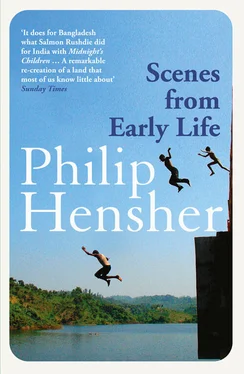In time, friends of Nadira asked if Altaf and Amit could come to teach them music, too. There was soon almost more teaching than they could cope with, and they grew to know the numbered streets of Dhanmondi very well, and wondered how they could ever have got so lost that first morning, when they had tried to find their way to Mr Khandekar’s house. There was even talk, at one point, of them being introduced to the household of Sheikh Mujib himself: Sheikh Hasina, his daughter, was said to have enquired about them of a friend. Nothing came of that, though they did see Sheikh Mujib and his daughter occasionally at the sort of gatherings in Dhanmondi where they sometimes played to an audience. They did have half a dozen regular visits to pay, and that was more or less the limit of what they could achieve.
The respectable and quiet streets of Dhanmondi had become fervently enthusiastic about the culture of the Bengalis. Behind the walls of many houses, conversations continued late into the night. Conversations about writers, artists, musicians, poets. Once the gates were shut against the outside world, against neighbours who could not be trusted, against the policemen in the streets and the laws of an alien people, households in Dhanmondi relaxed, and started to talk, and to listen to girls like Nadira-aunty singing a song as Altaf played the harmonium and sang too, and Amit’s palms and fingers pattered like rain on the tabla next to them.
The flower says,
‘Blessed am I,
Blessed am I
On the earth . . .’
Institutions started to open up. A school might decide to hold an exhibition of paintings on Bengali themes by its pupils – Pultoo was, at ten, the star of one of these exhibitions. At parties, the girls of the family might dance to the sitar and the harmonium; in other households, a member of the family might recite their own poetry. In Dhanmondi, on summer afternoons, families went from household to household, taking their music with them. Fifteen years before, the occupying Pakistani forces had tried to suppress the language of Bengal, and to force all in the province to write in an unfamiliar and alien script. (My own parents had demonstrated against this, in 1952, and had been thrown together into police cells; it was a happy and a romantic memory for them.) Now, in the last years of the 1960s, the Pakistani policemen stood around menacingly, and everyone knew who, in the neighbourhood, had been an informer, and probably still was one. Nothing seemed to matter. The Bengalis went from house to house with joyous abandon.
Among them were Altaf and Amit, who were universally welcome, and Nadira and her sisters; there were Nana and Nani and Mr and Mrs Khandekar; there was, too, Sheikh Mujib, whom you could see everywhere, on his way to forging a new country in the fires of his soul. He was the leader of a political party; his daughter was the one who had fretted and raged to my mother about the two missing bags of chilli. He lived under the constant threat of imprisonment, and sometimes he was trailed for days by the police, who sat endlessly in a car outside his house, a hundred yards away from Mr Khandekar. Sheikh Mujib came to these parties when he could; he said it made him glad to hear the songs of the Bengali. He made no particular fuss when he entered a room as a guest; still, he was who he was, and the room was drawn towards his big glossy hair, his plump, humorous look. The room stood up at his entrance: he would force a friend, perhaps a distinguished poet, to sit down again, before him. A special place was made for him, and perhaps for his daughter, Hasina, too. He would accept the special place while, all the time, protesting mildly with his hands. You never knew who you would meet at one of these parties. The gates stood open, and almost everyone was welcome.
Конец ознакомительного фрагмента.
Текст предоставлен ООО «ЛитРес».
Прочитайте эту книгу целиком, купив полную легальную версию на ЛитРес.
Безопасно оплатить книгу можно банковской картой Visa, MasterCard, Maestro, со счета мобильного телефона, с платежного терминала, в салоне МТС или Связной, через PayPal, WebMoney, Яндекс.Деньги, QIWI Кошелек, бонусными картами или другим удобным Вам способом.












